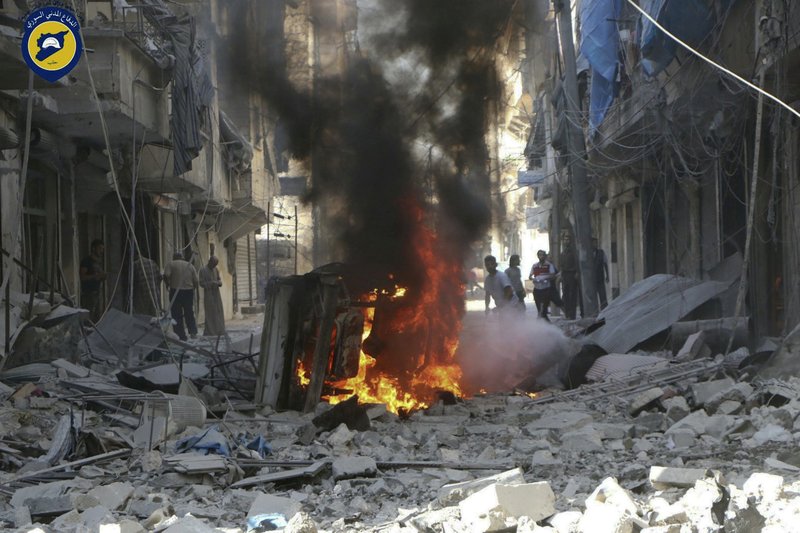BEIRUT -- A year of Russian airstrikes on areas outside government control in Syria has killed more than 9,000 people, displaced tens of thousands and caused widespread destruction, an opposition monitoring group said Friday.
On Sept. 30 last year, Russia began an air campaign backing the ground forces of Syrian President Bashar Assad, turning the balance of power in his favor in many areas -- including the northern province of Aleppo and the suburbs of the capital, Damascus.
Opposition activists have blamed Russia for most of the recent airstrikes against rebel-held neighborhoods of east Aleppo city that have killed more than 320 civilians in the past two weeks and demolished many buildings.
The anniversary came as violence in different parts of Syria claimed more lives Friday, mainly in Aleppo city where at least 12 people were killed and dozens more wounded.
A Syrian opposition monitoring group that tracks Syria's civil war said Russian airstrikes have killed 9,364 people in the war-torn country.
The Britain-based Syrian Observatory for Human Rights said the dead include 3,804 civilians, among them 906 children. The dead also include 2,746 members of the Islamic State extremist group and 2,814 from other rebel and militant groups.
Russia on Friday marked one year since it launched its air campaign in Syria in support of Assad. In light of that, the Russian Foreign Ministry issued a warning to Russians abroad about possible "provocations," urging them to exercise caution.
A spokesman for Russian President Vladimir Putin said Russia's involvement in Syria is justified by the fact that militants have not managed to capture the capital, Damascus. Marking the first anniversary, Dmitry Peskov said that Putin never gave a timeline for how long the bombing mission might last and still won't.
Russia's declared goal was to support the Syrian government of Russia's long-term ally Assad, and Peskov insisted that in that respect the operation has been a success.
If it wasn't for the Russian involvement, the Islamic State and other "terrorists" would have been "sitting in Damascus," he told reporters.
Regarding figures cited by the Observatory on casualties as a result of the airstrikes, he said he would not comment on reports by "a group based in the U.K." The Observatory relies on a network of activists on the ground inside Syria.
Also Friday, Russia's Foreign Minister Sergey Lavrov said Russia is doing all it can together with the Syrian government to help the U.N. arrange weekly pauses in Aleppo to deliver humanitarian goods.
"It's the Nusra-controlled people in eastern Aleppo who refuse," he said, referring to the Jabhat Fatah al-Sham militant group, which used to be known as the Nusra Front.
Speaking to BBC about his country's military operations in Syria, Lavrov said: "We are not using any munition which is prohibited by the United Nations. I can assure."
The backers of the opposition blasted the Russian intervention.
"Russia claims to be committed to a political solution in Syria, yet since its military intervention, the brutal Assad regime still clings to power. Russia's action has not curbed the regime's atrocities," said Britain's Special Representative to Syria, Gareth Bayley. "Russia has proved to be either unwilling or unable to influence Assad and must bear its responsibility for the Assad regime's atrocities."
Russia continues to blame the U.S. government and U.S.-backed insurgents for the collapse of a cease-fire earlier this month after one week. Lavrov told U.S. Secretary of State John Kerry in a phone call Friday that Washington must force the factions it supports to split from Jabhat Fatah al-Sham, according to Lavrov's office. The group is deeply intertwined with multiple factions regarded by the U.S. as moderates.
The State Department has threatened to end all diplomatic discussions with Russia on Syria if the assault on Aleppo continues. On Friday, State Department spokesman Mark Toner told reporters that the threat remains on the table.
"We're on the verge because we have not yet seen them take the type of actions we are looking for them to take," Toner said. "This is on life support," he said of U.S.-Russian diplomacy. "But it's not flat-lined yet."
A year after the airstrikes began, Syrian troops pushed into rebel-held eastern Aleppo.
The Observatory said government forces captured a hospital in the city a day after regaining control of a nearby Palestinian refugee camp.
State TV also reported intense fighting in the central Suleiman al-Halaby area where it said troops captured several buildings. The area is home to a main water station that supplies Aleppo, Syria's largest city and former commercial center, with drinking water.
The Local Coordination Committees, another monitoring group, said eight soldiers were killed in clashes with rebels near the water station.
Syrian government forces have been on the offensive in Aleppo for days under the cover of intense airstrikes. The state-run Syrian Arab News Agency said rebels shelled the government-held part of Aleppo, killing 20 and wounding 55.
Information for this article was contributed by Albert Aji, Jamey Keaten, Bradley Klapper and Nataliya Vasilyeva of The Associated Press.
A Section on 10/01/2016
